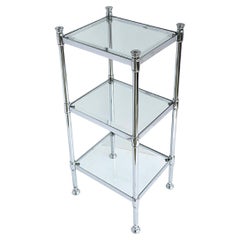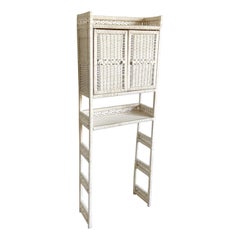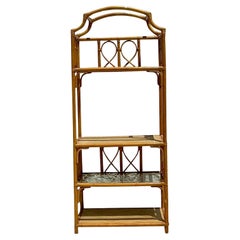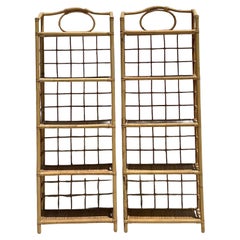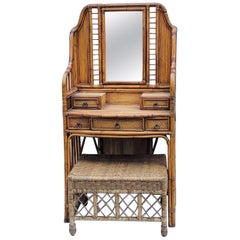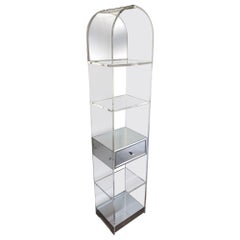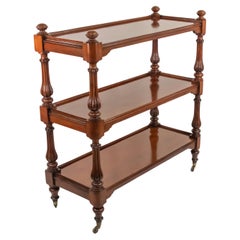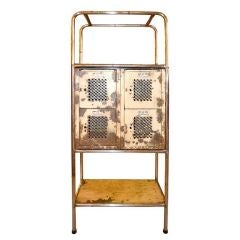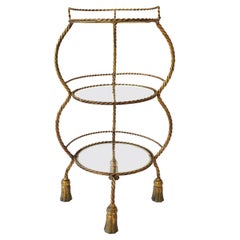Bathroom Etagere
to
2
9
7
5
2
1
1
1
1
1
1
Sort By
Chrome and Glass Shelving Storage Unit Étagère
Located in New York, NY
A chrome and glass bathroom shelving storage unit Étagère with finial tops. Piece is rectangular
Category
21st Century and Contemporary Bathroom Fixtures
Materials
Chrome
Boho Chic White Rattan and Wicker Bathroom Storage Etagere
Located in Delray Beach, FL
The Boho Chic White Rattan and Wicker Bathroom Storage Etagere offers an ideal storage solution
Category
Vintage 1980s Indonesian Bookcases
Materials
Wicker, Rattan
Vintage Coastal Notched Arched Rattan Etagere
Located in West Palm Beach, FL
dining spaces, or even as an upscale storage solution in a guest bathroom, this étagère brings both
Category
Late 20th Century Philippine Shelves
Materials
Bamboo, Rattan, Glass
Vintage Coastal Grid Rattan Low Etagere - A Pair
Located in West Palm Beach, FL
room, a tranquil bedroom, a welcoming entryway, or even a stylish bathroom.
Each étagère in this pair
Category
Late 20th Century Philippine Organic Modern Shelves
Materials
Bamboo, Rattan
$1,516 Sale Price / set
20% Off
H 63.5 in W 22.25 in D 12 in
Late 20th-C. Bamboo, Wicker, and Rattan Etagere or Vanity by Palecek
By Palecek Furniture
Located in Kennesaw, GA
This is a good looking late 20th century bamboo, wicker and rattan etagere or vanity by Palecek. It
Category
1990s Philippine Aesthetic Movement Vanities
Materials
Bamboo, Wicker, Wood
$3,495
H 62.5 in W 31.75 in D 17 in
1970s Custom Domed Lucite Étagère
By Charles Hollis Jones
Located in West Reading, PA
This is a 1970s Custom Domed Lucite Etagere with Chrome details.
It measures 12 inches deep, 15
Category
Vintage 1970s American Modern Vanities
Materials
Mirror, Acrylic, Lucite
Early 19th Century English Regency Mahogany Serving Table Dumbwaiter Server
Located in Chicago, IL
, nursery table, or bathroom étagère. The possibilities are endless.
H=51.25 in. W=48 in. D=19.5 in. 150
Category
Early 20th Century English Regency Serving Tables
Materials
Mahogany
$4,900
H 51.25 in W 48 in D 19.5 in
Industrial Designed Etagere with Vintage Gym Lockers
Located in Hanover, MA
Designed and fabricated by metal studio craft designer, Doug Meyer. Perfect etagere for your
Category
21st Century and Contemporary American More Furniture and Collectibles
Materials
Steel
Italian Gold Gilt Tole Étagère Shelves Storage or Display with Rope & Tassel
Located in New York, NY
An Italian gold gilt metal tole étagère storage or display piece with rope and tassel design, circa
Category
Mid-20th Century Italian Bathroom Fixtures
Materials
Metal, Tôle
$1,850
H 28.38 in Dm 16.63 in
Get Updated with New Arrivals
Save "Bathroom Etagere", and we’ll notify you when there are new listings in this category.
Bathroom Etagere For Sale on 1stDibs
Choose from an assortment of styles, material and more with respect to the bathroom etagere you’re looking for at 1stDibs. Each bathroom etagere for sale was constructed with extraordinary care, often using glass, metal and wood. Find 116 options for an antique or vintage bathroom etagere now, or shop our selection of 2 modern versions for a more contemporary example of this long-cherished piece. There are many kinds of the bathroom etagere you’re looking for, from those produced as long ago as the 18th Century to those made as recently as the 21st Century. A bathroom etagere is a generally popular piece of furniture, but those created in mid-century modern, Art Deco and modern styles are sought with frequency. Daum, Andre Hunebelle and Nick Leonoff each produced at least one beautiful bathroom etagere that is worth considering.
How Much is a Bathroom Etagere?
A bathroom etagere can differ in price owing to various characteristics — the average selling price 1stDibs is $1,845, while the lowest priced sells for $175 and the highest can go for as much as $24,975.
